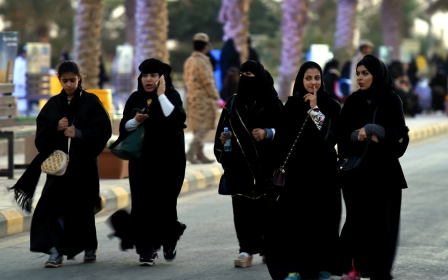Questions remain over Saudi decree easing women's guardianship

Saudi women no longer need a man's consent to carry out certain activities, local media reported on Friday, but activists said the royal order does not go far enough.
Saudi Arabia has some of the world's tightest restrictions on women, and is the only country where they are not allowed to drive.
Under the guardianship system a male family member, normally the father, husband or brother, must grant permission for a woman's study, travel and other activities.
But the Arab News said a royal decree issued by King Salman ordered that women are no longer required to obtain a guardian's consent for official services "unless there is a legal basis for this request" under Islamic law.
Government agencies were advised of this directive, the report said.
Other Saudi media including the Sabq online newspaper, which is close to authorities, have carried similar reports.
Sahar Hassan Nasief, a women's rights activist in the Red Sea city of Jeddah, welcomed royal attention to the issue but said it remained unclear what will change under the decree.
"We still need more. We still need to get rid of the guardianship completely," she told AFP.
Nassima al-Sadah, an activist in the Gulf coast city of Qatif, said she does not think the government is about to end guardianship.
"Maybe they will just reduce it," she said.
But Suhaila Zain Al-Abideen, a senior member at the Saudi-based National Society for Human Rights was more optimistic, and told Arab News that she believes the services covered would include women’s ability to independently represent themselves in court as well as to issue and renew passports and to travel abroad without needing a guardian’s permit.
Last year thousands of people signed a petition calling for an end to guardianship.
'We still need more. We still need to get rid of the guardianship completely'
- Sahar Hassan Nasief, women's rights activist
United Nations special rapporteur Philip Alston, on a visit to Saudi Arabia in January, said the guardianship system needs reform.
Activists say that even female prisoners have to be received by the guardian upon their release, meaning some have to languish in jail or a shelter beyond their sentences if the man does not want to accept them.
Although the government no longer requires guardian permission for women to work, Human Rights Watch said in an earlier report that many employers still demand guardian consent in order to hire a woman.
Some hospitals also require a guardian's approval before carrying out medical procedures, it said.
This article is available in French on Middle East Eye French edition.
Stay informed with MEE's newsletters
Sign up to get the latest alerts, insights and analysis, starting with Turkey Unpacked
Middle East Eye delivers independent and unrivalled coverage and analysis of the Middle East, North Africa and beyond. To learn more about republishing this content and the associated fees, please fill out this form. More about MEE can be found here.




